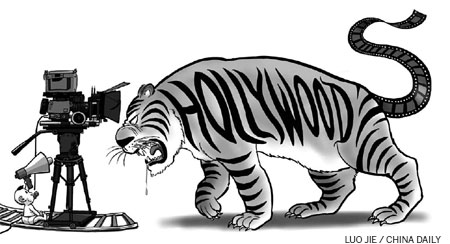Reel increases
Updated: 2012-02-25 08:30
By Raymond Zhou (China Daily)
|
||||||||


The raising of China's film import quota is creating more ripples in public discourse than in the film market.
The announcement that China will import 14 more films than the stipulated quota of 20 came as a surprise to many.
For one thing, the government had always shown unwavering determination to rebuff outside pressure to further open the country's film market.
Not that it is a behemoth of a market. At 13 billion yuan ($2.06 billion) of total box-office revenue for 2011 and a quite limited ancillary market (such as television rights and DVD sales), it was roughly 1/10th of the television market.
Some real-estate developers cannot help but scoff at it for being smaller than what one of their properties can fetch.
Yet films shown in movie theaters have a special allure.
A feature that is attended by 1 million filmgoers may well attract more media coverage than an online work that garners 100 times as many eyeballs.
You can call that the discrimination of the smaller screen. Not the "small screen" but the progressively smaller one.
The pecking order is more or less determined by the size of the screen, with the cinema screen at the top, followed by the television screen, then the computer screen and, finally, the mobile platform.
Maybe that is why the additional 14 imports are for the so-called "premium 3-D or Imax formats", which are larger in size or more lifelike than the other platforms.
At the tech-heavy high end of movie presentation, China lacks viable local products and thus needs a steady stream of imports to fill up the growing venues.
Pros and cons
The increase of film imports, especially big-budget ones, is a deja vu of the time when Hollywood blockbusters started arriving in China in 1994.
There were cries of wolf and predictions of the demise of Chinese cinema. But, as we all know now, the truth is much more complicated.
The recent readjustment of the import quota will have different impacts on different players in the movie industry.
For film exhibitors, or, movie houses, this is great news. More films will bring in more audiences. And China is building Western-style movie cinemas at a rate of eight new screens per day, and you'll need more content to fill these screens.
Of course, it is similarly good for moviegoers, who will have more choices. (Sure, the choices are far more online, but then the prestige of watching on a smaller screen is lower.)
For distributors, the rise of the share taken by the foreign producers from 13 percent to 25 percent means the Chinese side will make less money per ticket.
But more foreign blockbusters may mean higher total revenues for these Chinese distributors.
Overall, I'd predict the pros will outweigh the cons for the two distributors that are licensed to import foreign movies.
Economically speaking, the disadvantage of increased import will mostly fall on Chinese producers - and not just any filmmaker but those with the strategy to counter Hollywood with China's own blockbusters.
Suffice it to say, the market is limited in these kind of attention-getting capital-intensive undertakings. A hit like Avatar may hog the nation's screens for weeks or months, effectively pushing any competition, domestic or international, to the sideline.
As a matter of fact, there are rumors that homegrown productions not favored by the powerful distributors are sometimes deliberately placed on the same schedule as a major import to ensure its clean and quick death.
From the avalanche of interviews I have been giving over the past week on this topic, people seem to be worried about the fate of small independent pictures vis-a-vis stronger competition.
That fear is misplaced, I believe, as small movies are less the victim of big-budget pictures than of piracy.
Art-house favorites, such as The Piano in a Factory - arguably the best reviewed Chinese film of year 2011 - tend not to lose much when viewed on a smaller screen, and are thus more vulnerable than their beefy cousins to online streaming, legal or illegal.
Greenhouse effect
However, even for Chinese filmmakers who will be negatively affected by buffed-up foreign rivalry, the long-term effect can be more beneficial than pernicious.
If you look at the 100-year-plus history of Chinese cinema, it performs better when the competition is tougher.
Complacency runs most rampant when the domestic industry is completely shielded from any battle for survival.
That said, certain measures of protection are necessary for the healthy growth of the local film industry, especially when it is attempting to take off. If you thrust a fragile rose into the wilds, it may well be swept up by a hurricane. But if you let it take root and grow awhile before it is moved outdoors, things might be different.
Looking back at the past 18 years, it seems wise to phase in competition by starting with 10 movies, and gradually raising the quota to 20 and now 34. It gives domestic filmmakers both breathing room and time to grow and learn from the competition.
China's film industry would not be at the level it has reached today if all imports were shut out.
Of course, the degree of protection or market access can be fine-tuned - or debated for that matter. But it is a better and more calibrated approach than a shock therapy of total opening or total seclusion.
Some gripe about the "infiltration of foreign culture".
That is quite shortsighted.
Culture, unlike a cultural product, is not intellectual property. It cannot be copyrighted. Hollywood grows by absorbing whatever it deems useful, and why can't we?
The resistance to learn from dominant players, such as Hollywood, lies in a deep-rooted fear that we may lose our cultural identity. The academe is rife with voices of opposition toward Hollywood and acceptance of the European model.
But the way of telling a story onscreen is not intrinsic to any country.
Our filmmakers can tell Chinese stories more effectively by broadening our realm of narrative dexterity and incorporating the much tested and extremely successful Hollywood techniques. Why reduce ourselves to the periphery by refusing to recognize what works in film and holding on to what doesn't?
In commerce and trade, one does not have to lose for another to win. The same is true of cultural exchange.
Film is a popular form of art and entertainment exactly because audiences are more able to make a story their own while watching it.
What experts fear as the "other" is often filtered out in the viewing process.
That is a cultural product that works.
(China Daily 02/25/2012 page11)

 'Taken 2' grabs movie box office crown
'Taken 2' grabs movie box office crown
 Rihanna's 'Diamonds' tops UK pop chart
Rihanna's 'Diamonds' tops UK pop chart
 Fans get look at vintage Rolling Stones
Fans get look at vintage Rolling Stones
 Celebrities attend Power of Women event
Celebrities attend Power of Women event
 Ang Lee breaks 'every rule' to make unlikely new Life of Pi film
Ang Lee breaks 'every rule' to make unlikely new Life of Pi film
 Rihanna almost thrown out of nightclub
Rihanna almost thrown out of nightclub
 'Dark Knight' wins weekend box office
'Dark Knight' wins weekend box office
 'Total Recall' stars gather in Beverly Hills
'Total Recall' stars gather in Beverly Hills
Most Viewed
Editor's Picks

|

|

|

|

|

|
Today's Top News
Health new priority for quake zone
Xi meets US top military officer
Japan's boats driven out of Diaoyu
China mulls online shopping legislation
Bird flu death toll rises to 22
Putin appoints new ambassador to China
Japanese ships blocked from Diaoyu Islands
Inspired by Guan, more Chinese pick up golf
US Weekly

|

|






